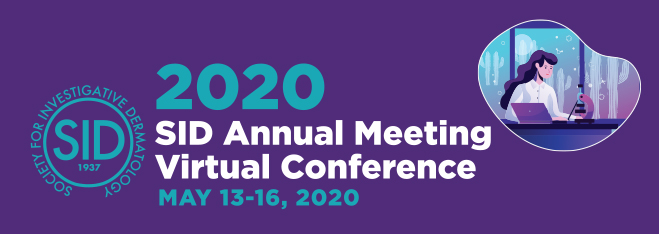Click the individual sessions below to access the agenda
Concurrent Sessions*
- Adaptive and Auto-Immunity – Studies of adaptive immune responses involving T and B lymphocytes, dendritic cells, other antigen presenting cells, and antigen processing and presentation; Basic and pre-clinical experimental studies focused on autoimmunity
- Carcinogenesis and Cancer Genetics – Studies on the genetics and other causes of cancer as well as mechanisms relevant to metastasis (Abstracts on therapeutics and clinical trials in skin cancer should be submitted to Translational Studies)
- Single Cell Transcriptomics and Cell-Cell Interactions in the Skin – Techniques and progress in single cell sequencing involving cell‐cell interactions between keratinocytes, nerves (neuro-cutaneous biology), stromal and immune cells in the skin and their local cellular and extracellular environments that affect skin inflammation, sensation (e.g., itch and pain), signaling, adhesion, migration, development and homeostasis
- Epidermal Structure and Barrier Function – Research on the components or regulation of keratinocyte proliferation, differentiation, including epidermal barrier function
- Genetic Disease, Gene Regulation and Gene Therapy – Studies on cutaneous gene expression and genetic diseases including gene therapy (Cancer-related genetic studies are more appropriate for Carcinogenesis and Cancer Genetics)
- Innate Immunity, Microbiology, Microbiome – Studies of cells, receptors and effector molecules of the innate immune response; studies on skin microbes, microbiome and infectious processes of the skin
- Interdisciplinary Spotlight (on the Microbiome)
- Patient Population Research – Studies of populations, including but not limited to epidemiological studies, behavioral studies, outcomes research and human services research
- Patient-Targeted Research – Studies involving direct interaction with patients, including but not limited to therapeutic interventions, clinical trials, and outcome measures
- Pharmacology and Drug Development – Basic and preclinical studies aimed at developing therapeutics, elucidating their mechanisms of action, and identifying biomarkers of drug activity
- Photobiology – Studies on biological, biochemical, and molecular responses to ultraviolet radiation in cells, animals and humans
- Pigmentation and Melanoma – Studies on all aspects of cutaneous and extracutaneous pigmentation; molecular cellular and biological facets of melanoma. (Genetic studies on melanoma should be considered for the category Carcinogenesis and Cancer Genetics)
- Skin, Appendages, and Stem Cell Biology – Studies on the hair follicle, sebaceous gland, and other skin appendages; developmental biology of skin and hair; roles of stem cells in pre and post-natal growth and development
- Skin of Color – Studies of the pathogenesis or treatment of skin diseases that disproportionately affect patients from, or are more severe in their manifestation in, racial/ethnic groups with skin of color; such as keloids, scarring alopecias, disorders of pigmentation, systemic lupus erythematosus, dermatomyositis, among others
- Tissue Regeneration and Wound Healing – Wound healing and regeneration studies; processes/signaling that regulate vascular development and angiogenesis; interactions between different skin components (epithelial cells, dermal cells, nerves, vasculature, melanocytes, fat) in homeostasis and regeneration
- Translational Studies – Studies that translate findings from laboratory studies, patient‐targeted research, or populations research into applications that improve knowledge of skin disease, patient outcomes, clinical practices, and/or public health.
* Please note that it is possible that not all the speakers in each session provided an uploaded talk. The SID has made every effort to encourage participation.

